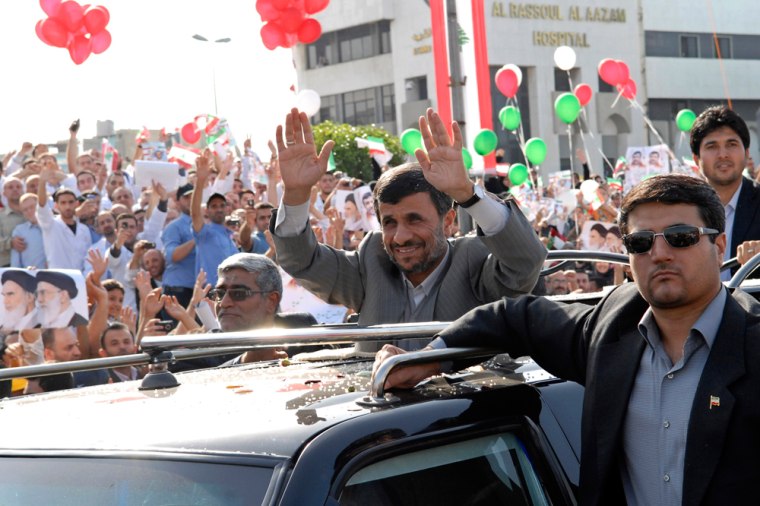Iran's president made a bold show of strength in Lebanon on Wednesday, vowing before thousands of Hezbollah supporters that U.S. and Israeli power in the Middle East will soon be eclipsed.
The visit by Mahmoud Ahmadinejad, welcomed by crowds of cheering Shiites, underscored the eroding position of pro-Western factions in Lebanon. More broadly, it suggested that the competition over influence in Lebanon may be tipping toward Iran and its ally Syria, away from the United States and it Arab allies Egypt and Saudi Arabia.
"We seek a unified, modern Lebanon," said Ahmadinejad, whose country is the main patron of the Shiite Hezbollah militant group, the most powerful military force in Lebanon. "We will stand with the people and government of Lebanon — and with all elements in the Lebanese nation — until they achieve all their goals."
Ahmadinejad sought to depict his country as an ally of the entire nation, not just Hezbollah. Iran, whose ties to the group date back nearly 30 years, funds Hezbollah to the tune of millions of dollars a year and is believed to supply much of its arsenal. Hezbollah boasts widespread support among Shiites and virtually runs a state-within-a-state in Shiite areas
But Ahmadinejad's dramatic arrival only exacerbated fears among many Lebanese — particularly Sunnis and Christians — that Iran and Hezbollah are seeking to impose their will on the country and possibly pull Lebanon into a conflict with Israel.
Lebanon's largest parliamentary bloc has condemned Ahmadinejad for treating the country as "an Iranian base on the Mediterranean".
'Provacative ways'
The United States and Israel criticized the visit, with White House spokesman Robert Gibbs saying Ahmadinejad is continuing his "provocative ways."
"We reject any efforts to destabilize or inflame tensions within Lebanon," U.S. Secretary of State Hillary Rodham Clinton said.
After meeting Lebanese President Michel Suleiman and signing a series of economic and commercial cooperation agreements, Ahmadinejad went to Hezbollah's stronghold in the Shiite district of south Beirut. Before a crowd of Hezbollah supporters, he gave a passionate speech denouncing the United States and Israel.
He blamed Washington for the heated sectarian divisions in Lebanon and elsewhere in the Mideast, saying the United States sought to create strife "between people from different religions who coexisted for hundreds of years." He warned that the only way for Washington to keep its position in the region was to "end the domination of the Zionist regime."
"The Zionist regime is sliding towards collapse, and no power is capable of saving it," he said.
Allies of Lebanon's Western-backed, mainly Sunni coalition, which is led by Prime Minister Saad Hariri, showed their worry over Ahmadinejad's visit.
A group of 250 politicians, lawyers and activists wrote an open letter to Ahmadinejad, criticizing his support of Hezbollah.
"Your talk of 'changing the face of the region starting with Lebanon' and 'wiping Israel off the map through the force of the Islamic Resistance in Lebanon' ... makes it seem like your visit is that of a high commander to his front line," the letter said.
In Tripoli, a mainly Sunni city in the north, posters have gone up in recent days showing Ahmadinejad's face crossed out, above the words: "No welcome to the rule of clerics."
While Ahmadinejad was formally invited by Suleiman, the splashiest welcome came from Hezbollah.
'He's not controlling Lebanon'
Thousands of Hezbollah supporters lined the highway from the airport into Beirut, waving Lebanese and Iranian flags for Ahmadinejad's arrival. Trailed by heavily armed security in bulletproof vests, Ahmadinejad smiled and waved from the sunroof of his black SUV as he passed, and the crowd threw flowers and sweets at his motorcade.
"Ahmadinejad has done a lot for Lebanon, we are here to thank him," said Fatima Mazeh, an 18-year-old engineering student who took the day off from classes to watch. "He's not controlling Lebanon. Everyone has a mind and can think for himself."
Most Shiites are grateful for Iranian support to Hezbollah, which fought the 34-day war, and for the support Tehran has given to reconstruction since then.
"He stood by us during Lebanon's troubles, and the 2006 aggression. It's not much to stand here to welcome him — even if we had to stand for two whole days," 50-year-old Mahmoud Darwish said as he waited with his son to greet Ahmadinejad.
On Thursday, Ahmadinejad is scheduled to make a trip to the Israeli border, which will emphasize Iran's support for Hezbollah's fight with Israel.
Israeli Foreign Ministry spokesman Yigal Palmor said Ahmadinejad "is the bearer of a violent message. He comes to a highly volatile region with the intention to play with fire."
Israeli lawmaker Arieh Eldad, from the ultranationalist National Union Party, went so far as to suggest that Israel assassinate the Iranian leader when he visits the border area.
Ahmadinejad's visit is his first to Lebanon since he became president in 2005.
While Iran gains strength in Lebanon, Hezbollah's other patron, Syria, also has been reasserting its role, with a prominent visit in July by Syrian President Bashar Assad.
Syria's nearly 30-year domination of Lebanon was broken in 2005, when it was forced to withdraw its military, and the pro-Western coalition came to power. But the coalition suffered a heavy blow in 2008, when Hezbollah fighters soundly beat Sunni gunmen in street clashes that erupted in Beirut. The unity government was later formed, giving Hezbollah a virtual veto power over Cabinet decisions.
A tenuous peace has held since. But there are fears it could be broken soon.
A U.N. tribunal investigating the 2005 assassination of former Prime Minister Rafik Hariri — the current prime minister's father — is expected to indict members of Hezbollah as soon as this month, raising concerns of possible violence between the Shiite force and Hariri's mainly Sunni allies.
